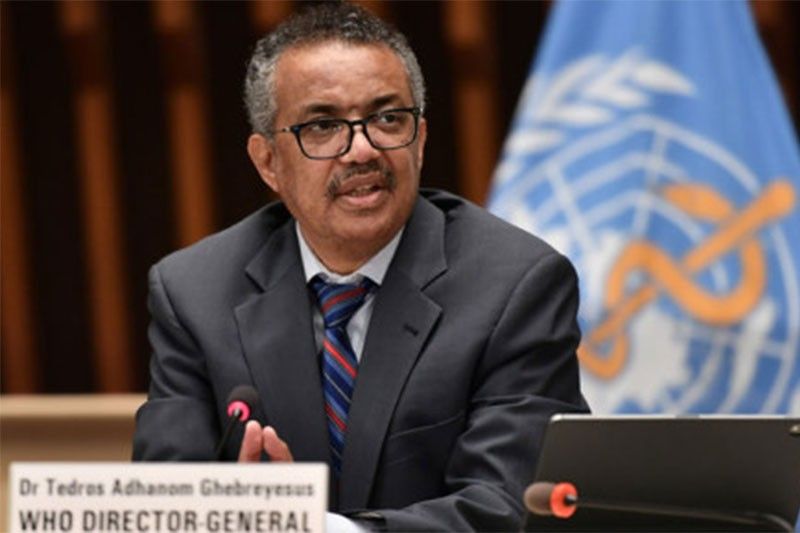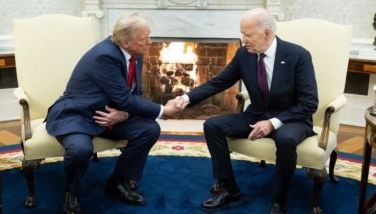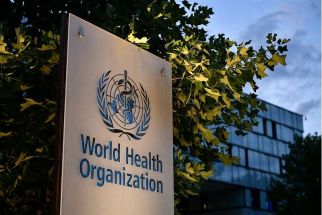WHO sees hope despite looming 750,000 virus death toll

GENEVA, Switzerland — The World Health Organization insisted Monday there was still hope of conquering the coronavirus pandemic despite the suffering behind the looming landmarks of 750,000 deaths and 20 million cases.
With both figures expected to be reached within days, the WHO stressed it was never too late to take action to suppress the COVID-19 crisis that has gripped the planet.
"This week we'll reach 20 million registered cases of COVID-19 and 750,000 deaths," WHO chief Tedros Adhanom Ghebreyesus told a virtual press conference.
"Behind these statistics is a great deal of pain and suffering. Every life lost matters. I know many of you are grieving and that this is a difficult moment for the world.
"But I want to be clear: there are green shoots of hope and... it's never too late to turn the outbreak around."
Tedros gave examples of countries that had successfully clamped down on the spread of COVID-19, citing New Zealand and Rwanda, and praised nations that had suffered major national outbreaks and were now responding quickly to local spikes.
"My message is crystal clear: suppress, suppress, suppress the virus," he said.
"If we suppress the virus effectively, we can safely open up societies."
The novel coronavirus has killed at least 731,500 people and infected nearly 19.9 million worldwide since the outbreak emerged in China last December, according to a tally from official sources compiled by AFP at 1100 GMT on Monday.
Vaccine rush
The race to produce a safe and effective vaccine is well under way at unprecedented speed.
A total of 165 candidate vaccines are being worked on around the world, according to a WHO overview.
Of those, 139 are still in pre-clinical evaluation, while the other 26 are in the various phases of being tested on humans, of which six are the furthest ahead, having reached Phase 3 of clinical evaluation.
However, WHO health emergencies programme director Michael Ryan said that finding a vaccine would not automatically spell the end for COVID-19.
"We have perfectly effective polio and measles vaccines, and we still struggle to eradicate or eliminate those diseases," the Irish epidemiologist said.
"Having an effective vaccine is only part of the answer. You've got to be able to deliver that vaccine to a population that want and demand to have that vaccine."
Maria Van Kerkhove, the WHO's COVID-19 technical lead, said experts did not yet have an answer as to whether people infected with one of the four globally-circulating common cold coronaviruses had some level of protection against the new coronavirus.
Outsmarting the enemy
Scientists think COVID-19 originated in bats and could have been transmitted to humans via another mammal.
Ryan said that adding billions to the global population, living in densely-packed conditions and exploiting the environment was fostering the conditions needed for diseases to jump species from animals to humans.
"We are actively creating the pressures that are driving the breaches of those barriers. We need to do better at managing the risks associated with that," he said.
Ryan said the virus it was "brutal in its simplicity and its cruelty but it doesn't have a brain".
He said humanity could therefore outsmart it "but we're not doing such a great job right now".
Van Kerkhove said the goal of the new coronavirus was to "make more virus" and find individuals to pass between without killing too many of its hosts and thereby ending its chances of transmission.
The US expert said it could be beaten with the "very unsophisticated" measures available now, such as physical distancing, regular handwashing, wearing facemasks and respiratory etiquette.
"Everybody on the planet needs to understand they have a role to play," she said.
Follow this page for updates on a mysterious pneumonia outbreak that has struck dozens of people in China.
New Zealand Prime Minister Chris Hipkins says on Sunday that he had contracted COVID-19, testing positive at a key point in his flailing campaign for re-election.
Hipkins saYS on his official social media feed that he would need to isolate for up to five days -- less than two weeks before his country's general election.
The leader of the centre-left Labour Party said he started to experience cold symptoms on Saturday and had cancelled most of his weekend engagements. — AFP
The World Health Organization and US health authorities say Friday they are closely monitoring a new variant of COVID-19, although the potential impact of BA.2.86 is currently unknown.
The WHO classified the new variant as one under surveillance "due to the large number (more than 30) of spike gene mutations it carries", it wrote in a bulletin about the pandemic late Thursday.
So far, the variant has only been detected in Israel, Denmark and the United States. — AFP
The World Health Organization says on Friday that the number of new COVID-19 cases reported worldwide rose by 80% in the last month, days after designating a new "variant of interest".
The WHO declared in May that Covid is no longer a global health emergency, but has warned that the virus will continue to circulate and mutate, causing occasional spikes in infections, hospitalisations and deaths.
In its weekly update, the UN agency said that nations reported nearly 1.5 million new cases from July 10 to August 6, an 80% increase compared to the previous 28 days. — AFP
The head of US intelligence says that there was no evidence that the COVID-19 virus was created in the Chinese government's Wuhan research lab.
In a declassified report, the Office of the Director of National Intelligence (ODNI) says they had no information backing recent claims that three scientists at the lab were some of the very first infected with COVID-19 and may have created the virus themselves.
Drawing on intelligence collected by various member agencies of the US intelligence community (IC), the ODNI report says some scientists at the Wuhan lab had done genetic engineering of coronaviruses similar to COVID-19. — AFP
Boris Johnson deliberately misled MPs over Covid lockdown-breaking parties in Downing Street when he was prime minister, a UK parliament committee ruled on Thursday.
The cross-party Privileges Committee said Johnson, 58, would have been suspended as an MP for 90 days for "repeated contempts (of parliament) and for seeking to undermine the parliamentary process".
But he avoided any formal sanction by his peers in the House of Commons by resigning as an MP last week.
In his resignation statement last Friday, Johnson pre-empted publication of the committee's conclusions, claiming a political stitch-up, even though the body has a majority from his own party.
He was unrepentant again on Thursday, accusing the committee of being "anti-democratic... to bring about what is intended to be the final knife-thrust in a protracted political assassination".
Calling it "beneath contempt", he said it was "for the people of this to decide who sits in parliament, not Harriet Harman", the veteran opposition Labour MP who chaired the seven-person committee. — AFP
- Latest
- Trending






























